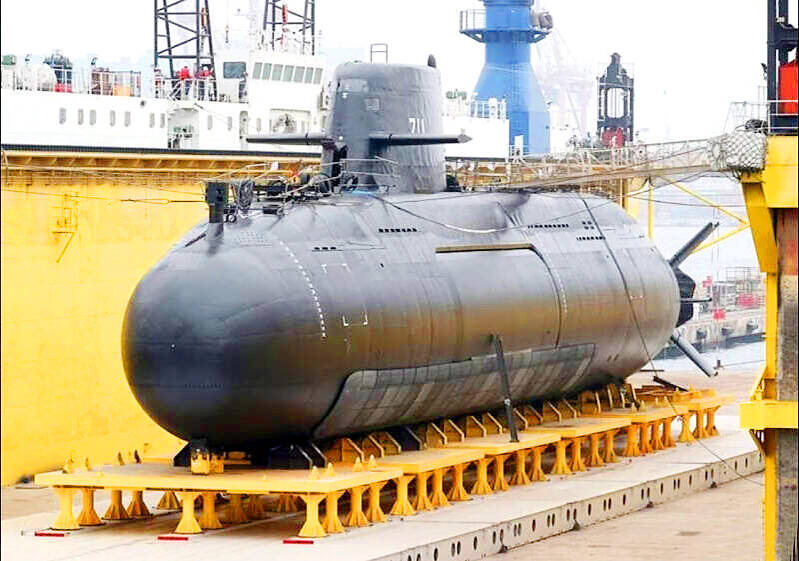The Ministry of National Defense (MND) has proposed a NT$284 billion (US$8.75 billion) plan to build seven attack submarines using an improved design based on the completed Hai Kun (海鯤), or “Narwhal,” prototype submarine, a source with knowledge of the matter said yesterday.
The plan — which has the support of high-ranking officials — falls under the ministry’s annual budget proposal that is to be submitted to the Executive Yuan, the source said, speaking on condition of anonymity.
The new submarines are designed to fire heavy torpedoes and Harpoon missiles, while the Hai Kun is only capable of firing heavy torpedoes, and they would feature better combat systems, the source said.

Photo: Lee Hui-chou, Taipei Times
These improvements mean the seven submarines would be substantially more expensive to produce than the Hai Kun, the source added.
The new submarines would be built in batches of three, two and two from next year to 2039, with an 18-month gap planned between each to integrate new improvements into the next batch, the source said.
The first of the new submarines would enter into production in 2026 and the second the following year, assuming the Hai Kun’s acceptance trials go according to plan, they said.
The ministry’s budget proposal for next year, which also includes several major investments in weapons systems, would be formally submitted early next month for the Executive Yuan’s approval, the source said.
The government’s general budget is expected to be filed for the Legislative Yuan to review by late next month, they said.
A separate source said navy top brass have long favored the submarine variant of Harpoon missiles, as the weapon inflicted devastating damage on a target ship in 2014.
The Chien Lung-class submarines in service can carry 28 torpedoes or missiles each, while the planned submarines are believed to be able to carry at least that number, the source said, also speaking on condition of anonymity.
With the seven submarines and the Hai Kun, Taiwan would have the ability to fire a least 224 additional projectiles, they said.

The Ministry of the Interior (MOI) is to tighten rules for candidates running for public office, requiring them to declare that they do not hold a Chinese household registration or passport, and that they possess no other foreign citizenship. The requirement was set out in a draft amendment to the Enforcement Rules of the Public Officials Election and Recall Act (公職人員選舉罷免法 ) released by the ministry on Thursday. Under the proposal, candidates would need to make the declaration when submitting their registration forms, which would be published in the official election bulletin. The move follows the removal of several elected officials who were

The Republic of China (ROC) is celebrating its 114th Double Ten National Day today, featuring military parades and a variety of performances and speeches in front of the Presidential Office in Taipei. The Taiwan Taiko Association opened the celebrations with a 100-drummer performance, including young percussionists. As per tradition, an air force Mirage 2000 fighter jet flew over the Presidential Office as a part of the performance. The Honor Guards of the ROC and its marching band also heralded in a military parade. Students from Taichung's Shin Min High School then followed with a colorful performance using floral imagery to represent Taiwan's alternate name

COVETED PRIZE: The US president would be a peace prize laureate should he persuade Xi Jinping to abandon military aggression against Taiwan, William Lai said US President Donald Trump should get the Nobel Peace Prize should he be able to convince Chinese President Xi Jinping (習近平) to abandon the use of force against Taiwan, President William Lai (賴清德) told a conservative US radio show and podcast in an interview. The US is Taiwan’s most important international backer, despite the absence of formal ties, but since Trump took office earlier this year he has not announced any new arms sales to the nation. Trump could meet Xi at the APEC summit in South Korea on Oct. 31 and Nov. 1. Lai, speaking on The Clay Travis and Buck Sexton

A Chinese takeover of Taiwan would severely threaten the national security of the US, Japan, the Philippines and other nations, while global economic losses could reach US$10 trillion, National Security Council Deputy Secretary-General Lin Fei-fan (林飛帆) wrote in an article published yesterday in Foreign Affairs. “The future of Taiwan is not merely a regional concern; it is a test of whether the international order can withstand the pressure of authoritarian expansionism,” Lin wrote in the article titled “Taiwan’s Plan for Peace Through Strength — How Investments in Resilience Can Deter Beijing.” Chinese President Xi Jinping’s (習近平) intent to take Taiwan by force